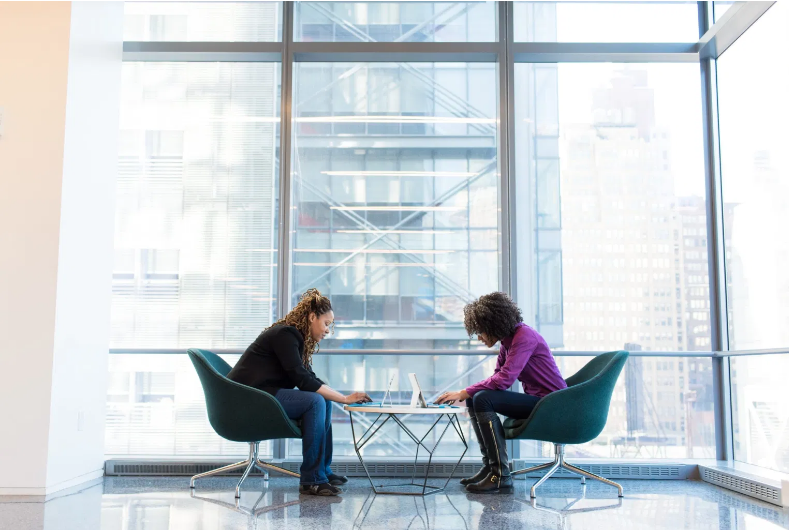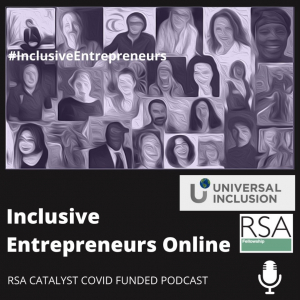Jacqueline Winstanley FRSA is working together with Dr Paula Holland, Senior Lecturer at Lancaster University, the Work Foundation and Manchester Metropolitan University Business School to conduct new research with disabled employees to explore their experiences of homeworking, how they can be better supported by employers when working from home and to understand how homeworking can be made more inclusive.

Following is an article by Dr Paula Holland, released on the Work Foundation Blog on the 12th of February, 2021. https://www.lancaster.ac.uk/work-foundation/news/blog/levelling-the-playing-field. You may contact Dr Paul Holland on This email address is being protected from spambots. You need JavaScript enabled to view it..
Levelling the playing field: Can increased access to homeworking help address the disability employment gap?
Posted on

The COVID-19 pandemic has led to a steep rise in unemployment in the UK. This is likely to be bad news for disabled workers and workers with long-term health conditions, who already faced severe employment inequality prior to the pandemic: in 2019, only 53.6% of disabled people in the UK were in work compared with 81.7% of non-disabled people, producing a disability employment gap of 28.1 percentage points. This overall figure, however, masks the more severe employment disadvantage experienced by specific groups of disabled people. For example, the TUC has found that the disability employment gap is particularly high for older disabled workers (35 percentage points for workers aged 50-64), for people with mental illnesses (53 percentage points), and for disabled people living in the North of England (33 percentage points).
The current economic context is concerning because the UK recessions of the 1980s-2000s increased the disability employment gap; employment fell among workers without long-term conditions but soon recovered, but in contrast, the employment rates of people with long-term conditions continued to fall in the years following each recession. Based on this evidence, the current downturn is likely to have a more severe and longer-lasting impact on the employment of disabled workers and workers with long-term health conditions.
More positively, the pandemic imposed compulsory homeworking for many office-based workers, which may prove beneficial to some disabled workers. The UK Equality Act 2010 requires employers to provide reasonable adjustments to support them at work, yet disabled workers frequently cite employers’ unwillingness to provide homeworking and other flexible working arrangements as a barrier to remaining in, or moving into, employment (1-4). Before the pandemic, many employers were reluctant to allow staff to homework due to lack of trust, a desire for workplace visibility and unavailability of appropriate technology (5,6), and only 5.2% of the workforce reported working mainly from home.
Working from home can support work retention for disabled workers by circumventing the daily commute and enabling work tasks to be arranged around energy levels, pain or medical appointments (7-11). In an international survey conducted prior to the pandemic, 83% of disabled workers in remote working roles reported that the option of remote working was essential to them being able to stay in work. There is evidence of unmet need, however; a pre-pandemic UK survey of workplace adjustments conducted by the Business Disability Forum found that 39% of disabled workers were able to homework but a further 17% felt they needed to.
Most studies of homeworking during lockdown focused on the experiences of the general workforce. Some homeworking employees reported missing physical interaction with colleagues, and lacking necessary equipment, space to work and clear boundaries between home and work (12). Working parents (particularly mothers) expressed experiencing additional strain from combining homeworking with childcare and home-schooling (12). On the other hand, the reported benefits of homeworking during lockdown included flexible scheduling, no commuting, increased family time and improved productivity and wellbeing (12,13). These perceived benefits led the majority of workers surveyed to express the desire to homework more following the pandemic (12,14). Increased productivity, as well as cost-savings from relinquishing office space, has led some employers to indicate they will make homeworking available to staff post-pandemic. A survey found that 74% of company directors plan to retain increased homeworking post-pandemic as it is ‘more effective’.
A UK study on the experiences of disabled lawyers revealed that homeworking had been the most commonly refused reasonable adjustment prior to the pandemic. Yet participants reported that homeworking during the pandemic gave them easier access to remote meetings, reduced their need to commute and meet clients, increased autonomy over how and when they worked, and improved their mental and physical wellbeing.
It remains to be seen whether there will be a permanent cultural shift to widespread availability of homeworking. Conferencing technology has facilitated participation in online meetings, conferences and webinars during the pandemic, making attendance easier and preventing the need to travel. If homeworking remains widely available it will increase accessibility to desk-based employment and contribute to reducing the disability employment gap, at least for workers in occupations able to performed at home. Increased access to homeworking for all workers may also reduce workplace conflict and stigma that can result from requesting it as a reasonable adjustment, and may encourage employers to recruit workers who may need to self-isolate or shield in further waves of the pandemic.
I will be working with the Work Foundation, Manchester Metropolitan University Business School and Universal Inclusion to conduct new research with disabled employees to explore their experiences of homeworking, how they can be better supported by employers when working from home and to understand how homeworking can be made more inclusive. Access to inclusive employment is central to an equitable and sustainable economy, for improving health and reducing health and employment inequalities. In ‘building back better’ there is real potential to level the playing field for disabled workers in the post-pandemic labour market.
References
1. Gewurtz R, Kirsh B. (2009) Disruption, disbelief and resistance: a meta-synthesis of disability in the workplace. Work 34:33–44. https://content.iospress.com/articles/work/wor00900
2. Holland P, Clayton S. (2020) Navigating employment retention with a chronic health condition: a meta-ethnography of the employment experiences of people with musculoskeletal disorders in the UK. Disability and Rehabilitation 42(8):1071-1086. https://doi.org/10.1080/09638288.2018.1519041
3. Holland P, Collins AM. (2020) Supporting and retaining employees with rheumatoid arthritis: the importance of workplace social support. The International Journal of Human Resource Management 10.1080/09585192.2020.1737175
4. Foster D, Hirst N. (2020) Legally Disabled? The Career Experiences of disabled people working in the Legal profession. Cardiff University. http://legallydisabled.com/researchreports/
5. Lupton P, Haynes B. (2000) Teleworking – the perception-reality gap. Facilities 18(7):323-327. https://www.emerald.com/insight/content/doi/10.1108/02632770010340726/full/html
6. Felstead A, Henseke G. (2017) Assessing the growth of remote working and its consequences for effort, well-being and work-life balance. New Technology, Work and Employment 32(3):195-212. https://onlinelibrary.wiley.com/doi/full/10.1111/ntwe.12097
7. Holland P, Collins AM. (2018) Whenever I can I push myself to go to work”: a qualitative study of experiences of sickness presenteeism among workers with rheumatoid arthritis. Disability and Rehabilitation 40:404-13. https://doi.org/10.1080/09638288.2016.1258436
8. West WD, Anderson A. (2005) Telework and employees with disabilities: Accommodation and funding options. Journal of Vocational Rehabilitation 23:115–122. https://content.iospress.com/articles/journal-of-vocational-rehabilitation/jvr00301
9. Kaplan S et al. (2006) A framework for providing telecommuting as a reasonable accommodation: some considerations on a comparative case study. Work 27(4):431–40. https://content.iospress.com/articles/work/wor00588
10. McNaughton D et al. (2014) ‘Home is at work and work is at home’: telework and individuals who use augmentative and alternative communication. Work 48(1):117–26. https://content.iospress.com/articles/work/wor01860
11. Linden M, Milchus K. (2014) Teleworkers with disabilities: characteristics and accommodation use. Work 47(4):473-83.
https://content.iospress.com/articles/work/wor01834
12. Chung H, Seo H, Forbes S, Birkett H. (2020). Working from home during the COVID-19 lockdown: changing preferences and the future of work. University of Birmingham and University of Kent. https://www.birmingham.ac.uk/Documents/college-social-sciences/business/research/wirc/epp-working-from-home-COVID-19-lockdown.pdf
13. Ipsen C, Kirchner K, Hansen JP. (2020) Experiences of working from home in times of covid-19 International survey conducted the first months of the national lockdowns March-May, 2020. https://orbit.dtu.dk/en/publications/experiences-of-working-from-home-in-times-of-covid-19-internation
14. Felstead A, Reuschke D. (2020) Homeworking in the UK: before and during the 2020 lockdown. WISERD Report, Cardiff: Wales Institute of Social and Economic Research. https://wiserd.ac.uk/publications/homeworking-uk-and-during-2020-lockdown
#covid #covid19 #homeworking
Disclaimer
The opinions expressed by our bloggers and those providing comments are personal, and may not necessarily reflect the opinions of Lancaster University. Responsibility for the accuracy of any of the information contained within blog posts belongs to the blogger.









